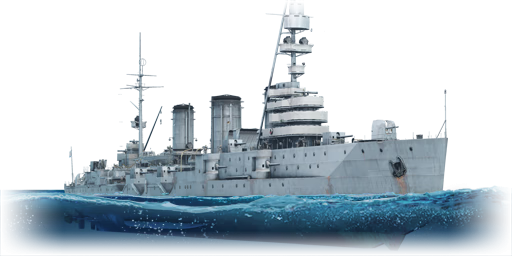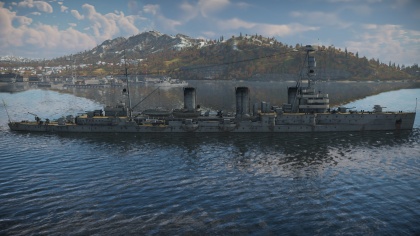Difference between revisions of "Krasny Krym"
Ishikawajima (talk | contribs) (→Torpedo armament) (Tag: Visual edit) |
Ishikawajima (talk | contribs) (→Primary armament) (Tag: Visual edit) |
||
| Line 23: | Line 23: | ||
The guns apart from being numerous are also quite spaced out and have relatively thick gun shields. You can safely assume that you '''will''' be able to return fire from at least few guns until the bitter end, since the possibility of rendering all of them useless is quite low. Even if after facing few salvos one side of the ship is inoperable, you have oldschool broadside cruiser at your disposal, you can always turn the other cheek and respond from the other side guns. | The guns apart from being numerous are also quite spaced out and have relatively thick gun shields. You can safely assume that you '''will''' be able to return fire from at least few guns until the bitter end, since the possibility of rendering all of them useless is quite low. Even if after facing few salvos one side of the ship is inoperable, you have oldschool broadside cruiser at your disposal, you can always turn the other cheek and respond from the other side guns. | ||
| + | |||
| + | Also, remember that you have big ammo reserves, 175 shells per gun at full load - you can be liberal with your fire should you want to. | ||
=== Secondary armament === | === Secondary armament === | ||
Revision as of 02:53, 23 July 2020
Contents
Description
The Svetlana-class, Krasny Krym, 1943 is a rank III Soviet light cruiser
with a battle rating of 5.3 (AB/RB/SB). It was introduced in Update 1.85 "Supersonic".
General info
Survivability and armour
Talk about the vehicle's armour. Note the most well-defended and most vulnerable zones, e.g. the ammo magazine. Evaluate the composition of components and assemblies responsible for movement and manoeuvrability. Evaluate the survivability of the primary and secondary armament separately. Don't forget to mention the size of the crew, which plays an important role in fleet mechanics. Tips for preserving survivability should be saved for the "Use in battle" section.
If necessary, use a graphic template to show the most well-protected or most vulnerable points in the armour.
Mobility
Write about the ship’s mobility. Evaluate its power and manoeuvrability, rudder rerouting speed, stopping speed at full tilt, with its maximum forward speed and reverse speed.
Armament
Primary armament
The 130mm cannons can be described in one word - inadequate. Being the destroyer calibre guns mounted on the outdated cruiser chassis they should be treated as ones. Do not expect to kill anything you would not be able to with late Soviet destroyers, the shells are not something you will be proud of. They also have quite low velocity, so you will most likely have troubles with accuracy at range. Aiming whole broadside is also somewhat difficult, since the guns do not share the levels of elevation nor horizontal guidance. Let that not scare you however, for they do have some redeeming quailties.First off, they are quite numerous. Full HE broadside can be quite devastating for anything unarmoured, but do not wish for miracles. When fighting against DDs you can feel relatively comfortable, blacking out few compartments at once, but facing any cruiser use your (usually) superior fire rate and saturate the whole enemy deck, hoping for fires or lucky shots disabling the enemy's armament and do not get disencouraged. You will have serious disadvantage against them but you can dish out some pain if you're lucky, especially since you'll be far from the top of the priority target list.
The guns apart from being numerous are also quite spaced out and have relatively thick gun shields. You can safely assume that you will be able to return fire from at least few guns until the bitter end, since the possibility of rendering all of them useless is quite low. Even if after facing few salvos one side of the ship is inoperable, you have oldschool broadside cruiser at your disposal, you can always turn the other cheek and respond from the other side guns.
Also, remember that you have big ammo reserves, 175 shells per gun at full load - you can be liberal with your fire should you want to.
Secondary armament
Some ships are fitted with weapons of various calibres. Secondary armament is defined by the weapon chosen with the control Select secondary weapon. Evaluate the secondary armament and give advice on how to use them. Describe the ammunition available for the secondary armament. Provide recommendations on how to use them and which ammunition to choose. Remember that anti-air armament, even heavy calibre weapons, belong in the next section.
Anti-aircraft armament
An important part of the ship’s armament responsible for air raid defense. Anti-aircraft armament is defined by the weapon chosen with the control Select anti-aircraft weapons. Talk about the ship’s anti-air cannons and machine guns, the number of guns and their positions, their effective range, and about their overall effectiveness – including against surface targets.
Torpedo armament
Don't even think about using these effectively. 3 torpedoes per side, no reload, Krym is far too sluggish and they by themselves are not exceptional. Pass, so you won't get accidentally detonated by something you won't even use.
Usage in battles
Describe the technique of using this ship, the characteristics of her use in a team and tips on strategy. Abstain from writing an entire guide – don’t get try to provide a single point of view, but give the reader food for thought. Talk about the most dangerous opponents for this vehicle and provide recommendations on fighting them. If necessary, note the specifics of playing with this vehicle in various modes (AB, RB, SB).
Modules
| Tier | Seakeeping | Unsinkability | Firepower | |||
|---|---|---|---|---|---|---|
| I | Dry-Docking | Tool Set | 130 mm pat.1928 SAP | Anti-Air Armament Targeting | ||
| II | Rudder Replacement | Fire Protection System | Smokescreen | 100 mm anti-air HE | Auxiliary Armament Targeting | |
| III | Propeller Replacement | Shrapnel Protection | Ventilation | 130 mm dist. granade | Improved Rangefinder | Primary Armament Targeting |
| IV | Engine Maintenance | New Pumps | Ammo Wetting | Torpedo Mode | ||
Pros and cons
Summarize and briefly evaluate the vehicle in terms of its characteristics and combat effectiveness. Mark its pros and cons in the bulleted list. Try not to use more than 6 points for each of the characteristics. Avoid using categorical definitions such as "bad", "good" and the like - they have a substitution in the form of softer "inadequate", "effective".
Pros:
Cons:
History
Krasny Krym was initially laid down in 1913 under the name ‘Svetlana’, and was the lead ship of her class of four. Svetlana-class light cruisers were intended for the Baltic Fleet of the Imperial Russian Navy and were therefore designed slightly differently in comparison to the closely-related, intended for Black Sea operations, Admiral Nakhimov-class (of which the already familiar Krasny Kavkaz was a part of).
By late 1917, Svetlana was nearing completion. In the meantime however, the Russian Empire was beginning to collapse and the ensuing revolutions, followed by a civil war, halted construction. After the establishment of the Soviet Union, work on the Svetlana continued in 1924, with the ship being renamed ‘Profintern’.
Work on the Profintern finally finished in July 1928, with the ship’s completed layout closely resembling the original one. Instead of being commissioned into service with the Baltic Fleet as originally planned, Profintern was instead assigned to the ranks of the Black Sea Fleet in 1929.
Throughout the ‘30s, the Profintern underwent substantial overhaul works, with her auxiliary weapon systems being upgraded and fire control systems improved. Shortly after the outbreak of WW2, the ship was renamed for the second and last time to Krasny Krym in October 1939.
Krasny Krym, similarly to her half-sister Krasny Kavkaz, served the entirety of WW2 as part of various operations in the Black Sea region. Most notably, taking part in the Siege of Sevastopol and the Kerch-Feodosiya Operation. As such, the ship was primarily tasked with escorting various convoys, evacuating and transporting troops as well as bombarding enemy positions with artillery fire. For her performance, Krasny Krym was also awarded with the elite Guards title in June 1942.
Following the end of WW2, Krasny Krym remained in active service for some time, although repurposed on several occasions. July 1959 marked the end of the ship’s service, with Krasny Krym being ultimately sold for scrap.
- From Devblog
Media
An excellent addition to the article will be video guides, as well as screenshots from the game and photos.
See also
Links to the articles on the War Thunder Wiki that you think will be useful for the reader, for example:
- reference to the series of the ship;
- links to approximate analogues of other nations and research trees.
External links
| USSR light cruisers | |
|---|---|
| Imperial Russia | |
| Svetlana-class | Krasny Krym* · Krasny Kavkaz* |
| * Laid down by Imperial Russian Navy; Finished and renamed by the USSR | |
| Project | Soviet Union |
| Pr.26 | Kirov · Voroshilov · Maxim Gorky |
| Pr.68 | Chapayev · Zheleznyakov |
| Pr.68-bis | Sverdlov · Mikhail Kutuzov |
| Pr.68-bis-ZiF | Shcherbakov |
| Lend-Lease | USA |
| Omaha-class | Murmansk |
| Trophies | Italy |
| Condottieri-class | Kerch |





